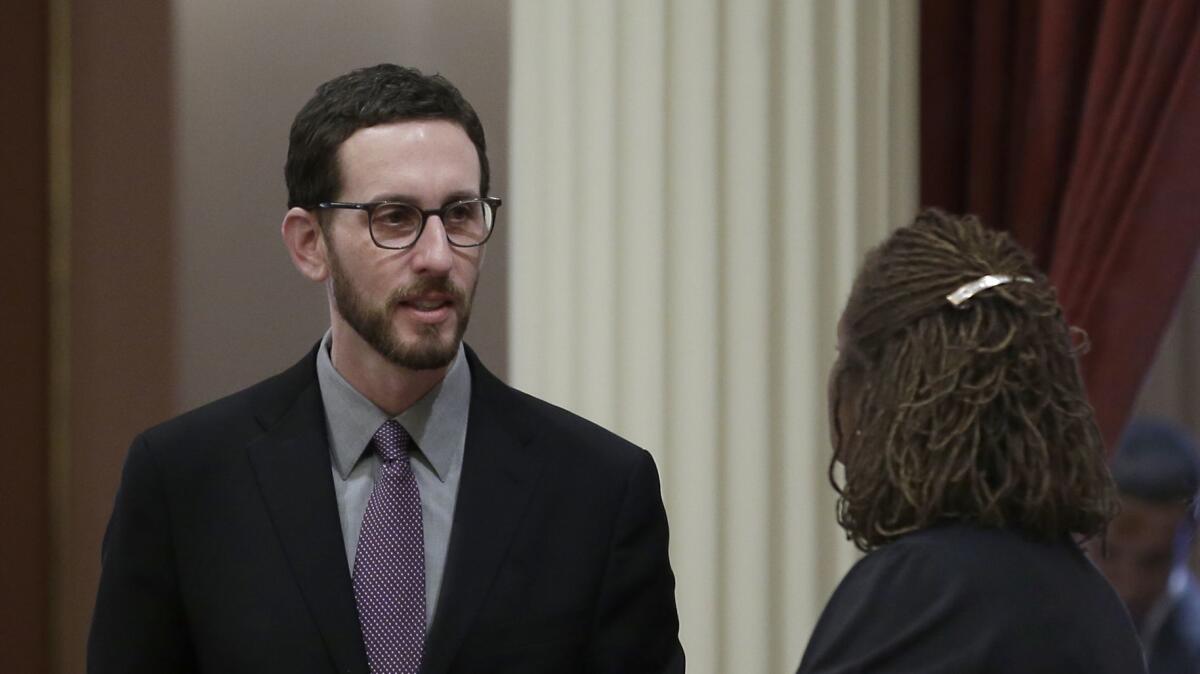Column: Internet providers’ big money leaves a California net neutrality bill ‘eviscerated’

- Share via
What a difference 60 days make. Two months ago, it looked as though California was on the verge of protecting the principle of network neutrality against an assault by big telecommunications companies and their wholly owned subsidiary, the Federal Communications Commission.
On Wednesday, however, the industry flexed its financial muscle and got the effort rolled back in a big way. In a state Assembly committee meeting, a bill aimed at safeguarding the internet from the big companies’ domination was “eviscerated” — to quote the measure’s sponsor, Sen. Scott Wiener (D-San Francisco).
The beneficiaries of the action are some of the biggest telecommunications companies in the country, which have spent millions on lobbying in Sacramento and campaign contributions in recent years.
As we’ve reported, network neutrality is the principle that internet service providers, which own the “last mile” interconnection between the internet and your home or business, can’t use their position to block content they don’t like, charge providers more for a “fast lane” into the home or stifle providers offering services that compete with the ISP’s own.
They will sue, they will raise every conceivable argument .... But we think we have the right to protect consumers and businesses in the state.
— Sen. Scott Wiener (D-San Francisco) in April
Under President Obama, the FCC protected network neutrality by banning those practices. But President Trump’s handpicked FCC chairman, Ajit Pai, has undone the FCC’s work. With the passage of time, the issue has become more important, as internet service providers such as Comcast and AT&T acquire producers of video and other content, and therefore greater incentives to favor their own content over rivals’. Just last week, AT&T merged with Time Warner, the owner of CNN and numerous other content providers, after a federal judge gave the deal a green light.
Wiener’s measure, SB 822, would restore some of the rules and regulations nullified by the FCC under Pai. California would join Washington state and Oregon, which have enacted net neutrality laws, and five other states — Hawaii, New Jersey, New York, Montana and Vermont — whose governors have signed executive orders upholding the principle.
Wiener’s measure passed the Senate on May 30. But on Wednesday, the state Assembly’s Communications and Conveyance Committee stripped several provisions out of Wiener’s bill, including some of the most far-reaching rules.
Among the eliminated provisions were some that would have placed California at the forefront of the drive for consumer protections in internet services. The gutted language included a limitation on so-called zero-rating, through which wireless internet service providers exempt certain content from customers’ data caps.
Zero-rating looks like a consumer boon — after all, who would complain about streaming a movie via Netflix without being dinged for data charges? But it’s a wolf in sheep’s clothing, for it gives internet providers a means of favoring some content companies over others.
Under President Obama, the FCC cast a suspicious eye on zero-rating, finding that programs offered by AT&T and Verizon appeared to favor their own content over outsiders’. The FCC was preparing to clamp down on the process, but then Donald Trump got elected President and his hand-picked FCC Chairman, Ajit Pai, shut down the investigations.
Wiener’s bill wouldn’t have outlawed zero-rating, but would have prohibited ISPs from taking pay for it. The measure would have allowed ISPs to exempt whole categories of content from data caps — gaming or movies, say — but not to limit the exemptions only to certain providers within those categories. “If AT&T says, if you use our product it won’t count against your data, but if you use our competitor’s product it will count,” Wiener told me in April, “that is anti-competitive, monopolistic behavior and it’s prohibited under our bill.”
Wiener expected heavy pushback from powerful telecommunications interests. “They will sue, they will raise every conceivable argument,” he told me in April. “They have every right in the world to do that. But we think we have the right to protect consumers and businesses in the state.”
Critics of the Assembly panel’s vote point to the potential conflicts of interest of committee Chairman Miguel Santiago (D-Los Angeles). Santiago has received nearly $38,000 in campaign contributions from the telecommunications industry over the last election cycle; AT&T has contributed more than $20,000 to his campaigns since 2014.
But examining campaign contributions to only a single legislator might be taking too narrow a view. The industry has inundated Sacramento with campaign cash. Just since last year, AT&T has contributed $1.3 million to candidates, party committees and other political entities. Comcast has spent more than $580,000.
The industry also has invested heavily in lobbying. AT&T spends about $2 million a year and Comcast about $1 million. Over the last four quarters, the California Cable and Telecommunications Assn., an industry group, has thrown in another $300,000. That’s a high financial wall for any regulatory legislation to scale.
Santiago tried to sugarcoat the committee’s action by claiming it was merely a first step. “We both believe a net neutrality bill should get out,” he told Wiener, according to my colleague Patrick McGreevy. “I’m willing to continue to engage.”
But that’s questionable. Bringing an effective net neutrality bill to the Assembly floor and then to the governor’s desk just became much more difficult.
Keep up to date with Michael Hiltzik. Follow @hiltzikm on Twitter, see his Facebook page, or email michael.hiltzik@latimes.com.
Return to Michael Hiltzik’s blog.



